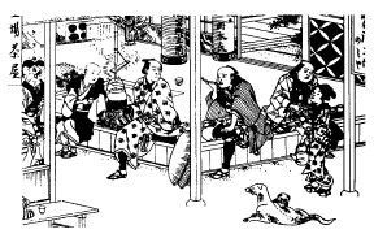Geography Reference
In-Depth Information
i.e. one
bu
of gold,
bu
being a weight used in weighing gold. Four
bu
of gold equaled one
ryō
(just over 18 grams), which was the weight of the most common gold coin, known as
the
koban.
This was a thin plate of gold, more or less elliptical in shape, 2.8 by 1.5 inches.
(54) Wayside teashop: the sign outside reads “Food for one
zeni
.” The customers include
a Buddhist priest. The waitress on the left is carrying a flask of
sake
. The travelers wear
straw sandals, the waitresses wooden clogs (
geta
).
There was also a larger gold coin still, the
ōban,
theoretically weighing ten
ryō,
but
actually between eight and nine. It was not, however, in common commercial use, being
reserved for ceremonial purposes. At various times smaller gold coins were produced, and
theseweretheonlyonesinthismetalthattheordinaryfamilywouldbelikelytohaveinits
possession.
Koban
were usedonlyfortransactions involving members ofthe warrior class,
or fairly large merchant-houses.
Kyoto and Osaka used silver as the superior metal to copper. Coins were of various
shapes and sizes, the largest being the
chōgin,
an elliptical coin, often quite roughly fin-
ished, measuring about 3.6 by 1.2 inches. The unit of silver weight was the
monme,
and
thispieceweighedabout43
monme
(alittleover161grams).Asmallercoin,the
mame-ita,
was hardly more than a rounded lump of silver, of indefinite weight and dimensions, with
a mark stamped on it to testify to the quality of the metal. At various times there appeared
smaller denominations, rectangular in shape and of fixed weight.
For large sums, silver coinage was made up into packets of convenient weight, such as
100
monme
and500
monme,
whilegold
koban
weremadeintoneatpacksof25,50,or100,
coveredwithstrongpaperandstampedeitherwithagovernmentsealorthatofalargecon-
cern. The normal practice was to use these packs without opening them. For transporting
and storing larger sums, special wooden strongboxes were made to hold a fixed amount:
1,000-
ryō
boxes were in most common use.

